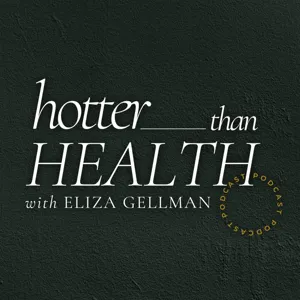Podcast Summary
Understanding Sleep Disorders and Their Impact on Health: Prioritize good sleep hygiene and seek treatment for sleep disorders to improve mental and physical health.
Sleep is a crucial aspect of mental and physical health that is often overlooked. Doctor Nigro and Julie discussed the importance of addressing sleep disorders and the various types of sleep issues people may experience. Sleep disorders can range from inconsistent or nonexistent sleep to nightmares and night terrors. Some common sleep disorders include sleep apnea, which can impact cardiac health if left untreated. It's essential to prioritize good sleep hygiene and seek treatment if necessary. Sleep disorders can significantly impact mental health, and addressing them can lead to improved overall well-being. Doctor Nigro emphasized that sleep is unique to living species and can have a significant impact on our mental and physical health. He encouraged listeners to reflect on their own sleep patterns and reach out if they have concerns.
Understanding Sleep Disorders and Their Impact on Health: Sleep disorders like insomnia and those related to bipolarity affect overall health and wellbeing. Proper diagnosis and treatment are crucial. Practice good sleep hygiene and seek professional help for persistent sleep disturbances.
Sleep disorders, such as sleepwalking, sleep paralysis, insomnia, hypersomnolence, and syncope, can significantly impact an individual's overall health and wellbeing. While insomnia is characterized by the inability to sleep despite desperate attempts, sleep disorders related to bipolarity involve a decreased need for sleep and are accompanied by feelings of grandiosity, euphoria, racing thoughts, and potentially negative consequences. It's crucial to differentiate between these conditions to ensure proper diagnosis and treatment. Sleep hygiene, such as avoiding caffeine and stimulant medications before bedtime, can help improve sleep quality. Sleep disorders are often overlooked, but they can have a profound impact on mood and overall health. Therefore, it's essential to prioritize good sleep habits and consult a healthcare professional if experiencing persistent sleep disturbances.
Identifying the root cause of sleep disorders for effective treatment: Thorough history and diagnostic clarity are essential to determine the underlying cause of sleep disorders and ensure proper treatment, which may involve cognitive behavioral therapy instead of hypnotics.
Understanding the root cause of sleep disorders is crucial for effective treatment. Sleep disorders can be caused by various underlying conditions such as anxiety, depression, or even generalized anxiety disorders that require specific treatments. Masking the symptoms with hypnotics without addressing the root cause can be ineffective. Cognitive behavioral therapy is a recommended approach, and a thorough history and diagnostic clarity are essential for proper treatment. Sleep disorders can significantly impact mood, relationships, and overall well-being, making it a critical topic for providers to address.
Medications for sleep problems: A holistic approach: Trazodone and mirtazapine, with their unique properties, can effectively treat insomnia, depression, and anxiety with one prescription. However, they can cause drowsiness and may not be suitable for everyone. Lower doses of mirtazapine can be beneficial for insomnia and depression without significant weight gain.
Effective treatment for sleep problems often involves a holistic approach beyond medication. Sleep hygiene practices and meditation techniques can be helpful. However, there are certain medications, like trazodone and mirtazapine, that can treat insomnia, depression, and anxiety with one prescription. Trazodone and mirtazapine, also known as Remeron, have unique properties: trazodone is a selective serotonin antagonist and mirtazapine is an antihistamine. While these medications can be effective for treating multiple conditions, they can cause drowsiness and may not be suitable for everyone, especially those who cannot tolerate high doses due to side effects like morning grogginess. Lower doses of mirtazapine, between 7.5 and 15 milligrams, can be beneficial for insomnia and depression without significant weight gain. Ultimately, the goal is to find the least amount of medication necessary to address all symptoms and improve overall quality of life.
Combining Effexor and Remeron for Depression Anxiety: Using Effexor during the day and Remeron at bedtime can effectively treat depression anxiety. Trazodone, another sleep aid, is less addictive than Ambien but requires careful timing. Benzodiazepines, while effective for sleep, are highly addictive and require professional tapering if stopping use.
When treating depression anxiety, a combination of Effexor (Venlafaxine) and Remeron (Mirtazapine) is often used, with Remeron taken at bedtime and Effexor during the day. Trazodone, another serotonin antagonist, requires careful timing to avoid disrupting sleep. Unlike some other medications mentioned, such as Ambien (zolpidem), trazodone is not typically addictive. However, Ambien, originally designed to treat insomnia, can be addictive and has a longer half-life than desirable for sleep medication. Benzodiazepines, another class of sleep medications, are highly addictive and can lead to cognitive impairment and memory loss. If you're considering tapering off Benzodiazepines, it's crucial to consult with your healthcare provider and have a tapering plan in place.
Seeking Professional Help is Crucial for Benzodiazepine Detox: Professional help is necessary for managing the risks and complexities of benzodiazepine detox, especially for the elderly and those with mental health conditions.
If you're feeling nervous about coming off of benzodiazepines, it's important to seek professional help at an emergency room or detox facility. Benzodiazepines are temporary solutions that don't correct neurological issues, and can be particularly risky for the elderly due to absorption issues and fall risks. When coming off of benzodiazepines, there's a risk of seizures, so it's crucial not to attempt this on your own. If you're concerned about someone's dependence or risk of seizures, their doctor may consider adding a mood stabilizer or anticonvulsant to help manage the detox process. Additionally, for those experiencing manic episodes, it's important to seek emergency care, as mania can be extreme and potentially dangerous. Overall, the key takeaway is that seeking professional help is essential when dealing with the complexities of managing benzodiazepines and mental health conditions.
Recognizing bipolarity as a neurological condition and treating it with specific medications: For effective management of bipolarity, recognize it as a neurological condition, consider more sophisticated medications for mania like Vraylar, and address underlying mood disorders before treating insomnia with sedatives.
Understanding bipolarity involves recognizing it as a neurological condition characterized by mood seizures, requiring specific treatments. For mania, more sophisticated medications like Vraylar are recommended, rather than sedatives. For insomnia related to bipolarity, sedative medications like Seroquel or newer options like Vraylar and lorazodone can be considered. However, it's essential to treat the underlying mania or depression first, as addressing the sleep issue alone may not be effective. Lorazodone, in particular, is effective for bipolar depression. Always consult a healthcare provider for the best treatment plan.
Nightmares from Past Traumas: Treatment Options: Nightmares caused by past traumas can be treated with medications like prazosin, tricyclic antidepressants, Benadryl, melatonin, and hydroxyzine. Individual responses to medication vary, so it's crucial to consider potential side effects and consult a healthcare professional.
Nightmares and disrupted sleep can be a result of past traumatic experiences, leading to conditions like PTSD. Flashbacks, specifically nightmares, can be treated with medication such as prazosin, which stops the flow of adrenaline and helps calm the body during the nightmare. Other common sleep medications include tricyclic antidepressants, Benadryl, melatonin, and hydroxyzine. Everyone metabolizes medication differently, so it's important to remember that what works for one person may not work for another. Additionally, some medications, like Benadryl, can have side effects and should be used with caution.
Medications, Sleep Hygiene, and Specialists: Medications with sedative properties can cause side effects in the elderly. Longer-acting Benzodiazepines are used in emergencies but should be used cautiously. Sleep hygiene is essential. Primary care providers treat sleep disorders, and addressing underlying conditions is crucial for improving sleep quality. Substance use can disrupt sleep.
Certain medications, like those with anticholinergic and antihistamine properties, can cause sedation but may not be suitable for the elderly due to potential side effects. Longer-acting Benzodiazepines, which remain in the brain longer than shorter-acting ones, are commonly used in emergency rooms for anxiety or panic attacks. Sleep hygiene is crucial for addressing sleep issues, and it's essential to be cautious when combining certain medications or holistic remedies. Sleep disorders, such as insomnia, restless leg syndrome, narcolepsy, and sleep apnea, should be treated by primary care providers who specialize in these conditions. It's important to remember that sleep disturbances can be a symptom of various psychiatric conditions, and addressing the underlying condition is key to improving sleep quality. Additionally, substance use, such as alcohol and marijuana, can disrupt sleep and should be approached with caution.
A powerful reminder of medication addiction: The podcast episode shares a firsthand account of Benzodiazepine addiction and its struggles, offering important insights into addiction and encouraging listeners to take care of themselves and each other.
The podcast episode they mentioned, which is about a firsthand account of being addicted to Benzodiazepine, serves as a powerful reminder of the potential dangers and struggles of medication addiction. It's a compelling story that she encourages listeners to check out. Additionally, she thanks everyone for their support and encourages listeners to reach out to her through various channels, including email, Instagram, or by phone. She also mentions her love for Bruce Springsteen and her hope to meet him someday. Overall, the episode offers important insights into addiction and serves as a reminder to take care of ourselves and each other. Don't hesitate to reach out to her for any questions or comments.






 Hello there
Hello there 